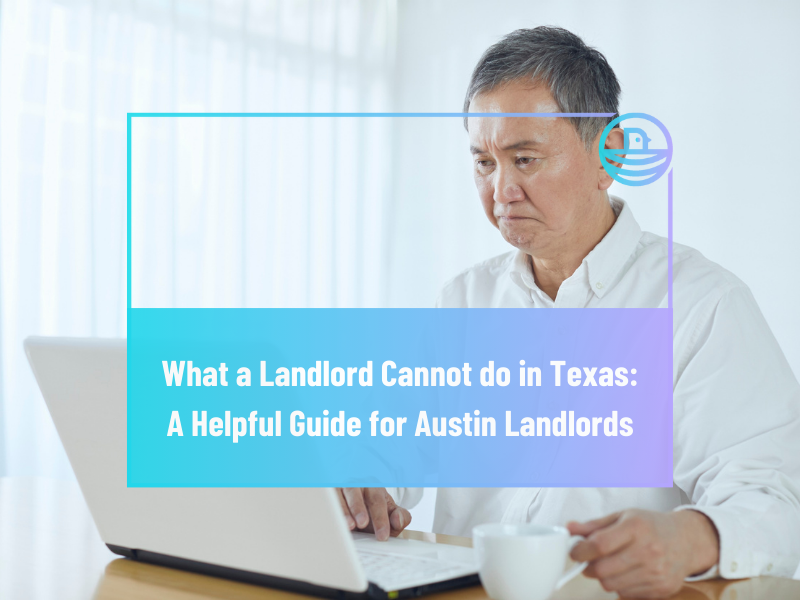Owning a rental property in Austin, Texas can be a smart investment, but only if you understand the legalities that come with it. Known for being landlord-friendly, there are still strict rules about what a landlord cannot do in Texas, as outlined in local landlord-tenant law. Breaking these rules — even accidentally — can result in fines, lawsuits, and damaged relationships with tenants.
This guide will walk you through the legal restrictions in Austin,outline what a landlord cannot do in Texas, highlight tenant protections unique to the city, and explain how an Austin property management company can help you stay compliant.
Tenant Rights Every Austin Landlord Must Respect
.png)
Landlords and tenants in Austin are held to the Texas Property Code, which lays out the rights and responsibilities of both parties. In many cases, the law gives landlords more control than in other states, but it still protects renters. In Austin, renters tend to be well-informed of their rights. Groups like the Austin Tenants Council educate renters and help them take action when the law is broken. This is why it’s essential to understand what a landlord cannot do in Texas. Even honest mistakes can lead to legal trouble.
What a Landlord Cannot do in Texas
1. Discriminate Against Tenants
In Texas, both the federal Fair Housing Act and Texas Fair Housing laws make it illegal to treat someone unfairly based on characteristics like:
Race or skin color
Religion
Gender
Disability status
Family status
National origin
As a landlord, you also aren’t allowed to write unfair rules into your listings. Even something that seems harmless to write, like “perfect for child-free couples” or “single professionals preferred” could count as discrimination.
You’re required to treat every rental applicant equally and fairly. To protect yourself, partner with a reputable Austin property management company like Evernest, which uses a consistent resident screening process to check credit, income, and background.
2. Retaliate Against Tenants
Tenants in Austin have the right to speak up if the rules get broken. They’re allowed to ask for repairs, report unsafe conditions, and file complaints—and it’s illegal for landlords to punish them for doing so.
Retaliation can look like:
Raising the rent after the tenant complains
Scheduling unnecessary inspections just to bother the tenant after they request a repair
Refusing to fix something to get back at the tenant for reporting something
Threatening eviction without a good reason after a request for safer living conditions
Shutting off the water or other utilities after the tenant makes a complaint
Since tenants are likely to know their rights in Austin, this kind of behavior can get you in trouble fast. Even small actions can look like retaliation under the right circumstances.
3. Enter a Rental Without Notice
Renters deserve the right to privacy and quiet enjoyment, which are covered in the landlord/tenant law. In Austin, a landlord can only enter the rental property in specific instances, unless the tenant gives permission or the lease allows it. Some of the most common reasons a landlord can enter the property include:
Making repairs
Changing a filter
Leaving a notice
Doing pest control
Even though Texas doesn’t require a set amount of notice, most Austin landlords give 24 hours of notice before entering the home. Unless there’s an emergency like a fire or broken pipe, it’s important to let tenants know when and why you’re entering.
4. Lock Tenants Out or Shut Off Utilities
Even if a tenant stops paying their rent, Texas law forbids self-help evictions, which include:
Removing or damaging a tenant’s belongings
Refusing to provide a key
Permanently changing the locks without a court order
Taking these actions on your own could lead to legal penalties. However, there is one exception: temporary lockouts for non-payment of rent. This is different from an eviction, and you can only move forward with one if:
Your lease states this right
The tenant is behind on rent
You provide a written notice and 24-hour contact number for key retrieval
You don’t do it more than once during a rent period
Remember that no one can be inside while you change the lock.
5. Keep Security Deposits Without Cause
When a tenant moves out, you have 30 days to return their security deposit. If you’re keeping any of it, you must send a written list explaining why. You can deduct money for:
Unpaid rent
Big repairs from damage the tenant caused
Heavy cleaning if the place was left in bad shape
You cannot keep the deposit just because you didn’t care for the tenant or because the unit had normal wear and tear (like dirty grout or loose door handles). Austin property management companies keep detailed records and handle accounting for you so that you don’t have to worry about mishandling security deposits.
6. Evict Without Following the Law
Evictions in Austin are on the rise, recently rising well above pre-pandemic levels. While you may be in a hurry to get a tenant out, you can’t do anything without first going through the local Justice of the Peace court in the precinct where your property is located. Here’s an overview of the process:
Give the tenant a written Notice to Vacate (in person, mailed, or attached to the front door). It must include a move-out date and you must wait three days before filing, unless your lease gives a different time frame.
File the eviction in the court.
Go to the court hearing and wait for a judgment.
Both parties have five days to appeal the decision. The tenant can do so if the Notice to Vacate wasn’t delivered correctly, the eviction was discriminatory or retaliatory, the unit was inhabitable, or the landlord accepted rent payment after the eviction process began. If there’s no appeal, the landlord can ask for a Writ of Possession, allowing the tenant to be legally removed after a 24-hour notice from the constable.
Legal reasons for evictions include illegal activities on the property, a tenant overstaying the lease term, non-payment of rent, and lease violations. Involving an Austin property management company in the eviction process can help ensure that every step is carried out legally.
7. Ignore Health & Safety Standards
Landlords are responsible for providing a habitable living environment for tenants. This is taken seriously in Austin, especially in older buildings in neighborhoods like Clarksville, East Side, or North Loop. Under the Texas Property Code, you must repair:
Moldy areas
Roach, rodent, or other pest infestations
Heating or A/C failures (especially important during Austin’s hot summers)
Broken locks, doors, or windows
Plumbing issues, like lack of hot water
Anything that violates the city’s health, fire, or building code
Failure to abide by these rules means that your tenant has the legal right to put in a complaint, break the lease and move out, or hire someone to make the repair and deduct the cost from the rent. Austin property management companies are well-aware of these rules and know how to handle smaller concerns before they become bigger legal issues.
How Austin Landlords Can Stay Compliant
Here are a few simple ways to protect your business and reputation as an Austin landlord:
Communicate clearly and respectfully with your tenants
Use a lease that follows the law
Give proper notice before entry
Keep detailed records of payments, communication, notices, and repairs
Tenant expectations can be high, especially in areas like The Domain or South Congress, which are growing quickly. When in doubt, it’s worth consulting with a real estate attorney or working with a property manager to keep your tenants happy and avoid stepping outside of the boundaries of the law.
Wrapping Up: What a Landlord Cannot do in Texas
Being a landlord in Austin means you can’t retaliate, lock tenants out illegally, enter without notice, skip the eviction process, discriminate, or ignore safety issues. Understanding what a landlord cannot do in Texas helps you avoid legal problems, stay on good terms with tenants, and keep your investment secure.
If you need help staying compliant, consider working with an Austin property management company like Evernest to protect your property and peace of mind.


